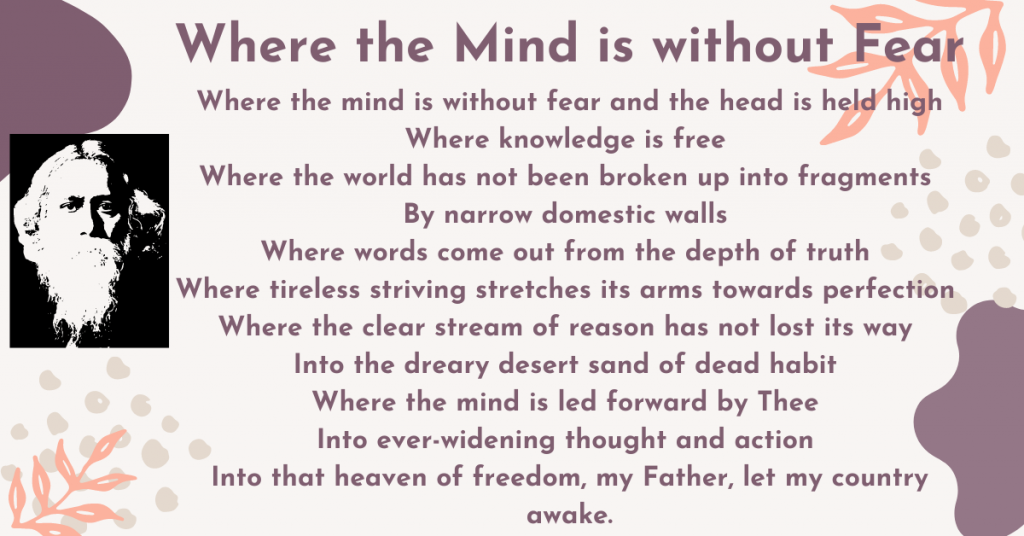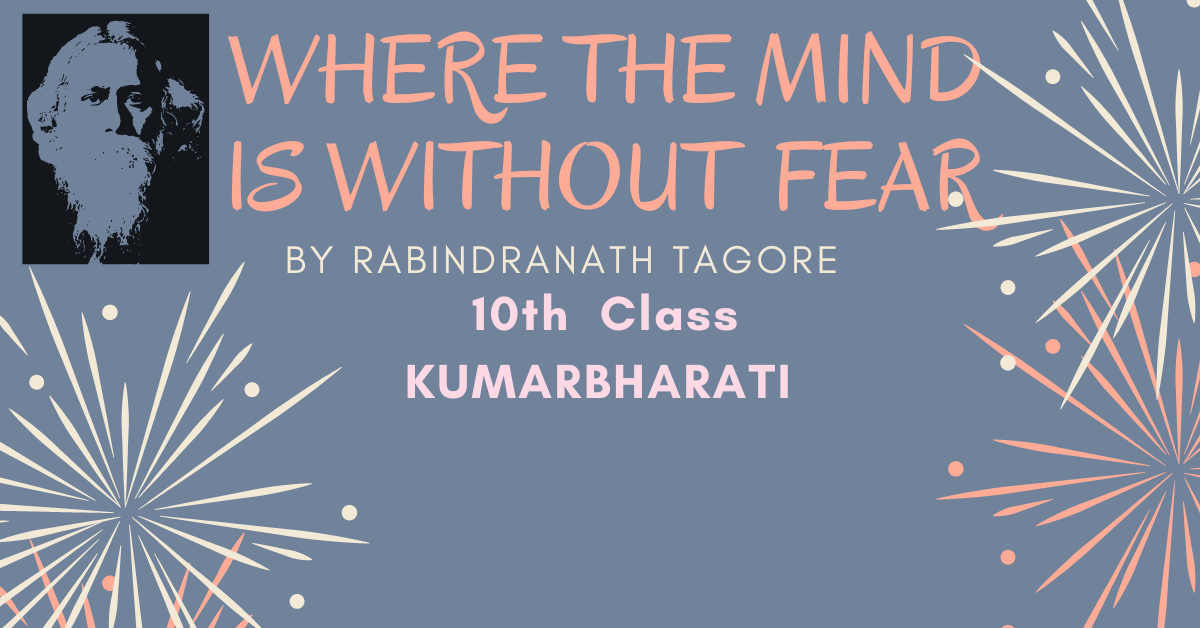Poem: Where the Mind is without Fear…. 10 Class KUMARBHARATI
The poem Where the Mind without Fear.. is for class 10th in the Kumarbharati textbook. On the poem, students will be asked extract to solve the activities under it and appreciation for 4 marks in the S.S.C. exam. The poem: where the Mind without Fear is written by the great poet Rabindranath Tagore.
Introduction: Poem: Where the Mind is without Fear
- Rabindranath Tagore (1861-1941) was the author of Gitanjali and its ‘profoundly sensitive, fresh and beautiful verse’. He became the first non-European to win the Nobel Prize in Literature in 1913.
- This poem is one of his vastly read and discussed poems. It was originally composed in Bengali and later he himself translated it into English. This poem is from his Nobel Prize winning anthology ‘Gitanjali’.
- Tagore lived during the time when India was ruled by the British. In this poem, besides political freedom from British, Tagore also appeals to God for social, educational and economic freedom for the people of India.
Poem: Where the Mind without Fear….

Explanation: Poem: Where the Mind is without Fear
- The poem, where the Mind without Fear is written by the great poet Rabindranath Tagore. The poem is a prayer to God about the concern of the Indian people. The poet wants the world will free from any fear as well as any caste, creed, religion, old traditional rituals, and customs. With that intention, the poet writes the poem Where the Mind is without Fear.
- The poet explains that where the mind is without fear that no one lives in fear and lives life with pride and holds the head always high in pride. Poet wants to see a world where knowledge is free from any caste, creed, religion, old traditional rituals, and customs. The poet expects that the world has not been broken up into small pieces (fragments) by division based on religion, caste, class, and colour in societies. Poet says that in such a world where people will always speak the truth and in such a world people will take an effort and struggle continuously without getting tired and reaching success.
- The poet says that people have a clear purpose in life and they should not lost in traditional rituals and customs that are harmful to them and they should have the power they should reason out bad and useless traditions and customs.
- At last, the poet prays to God that God leads the mind of people forward and forever broadens one’s outlook in the condition of total freedom of good thoughts, good words, and good deeds while respecting those of others. The poet asks to God let the Indian country always be awake.
Appreciation: Poem: Where the Mind is without Fear
- The title of the poem, where the Mind is without Fear…. Is very apt and suitable for the theme of the poem. In this poem, the poet sees the world which is without fear of slavery in any country. The poet Rabindranath Tagore is a very great poet who got the Nobel Prize in Literature in 1913 for the collections of the poem Gitanjali and became the first non-European to win the Nobel Prize in Literature.
- The theme/ central idea of the poem is that the poet wants that India will live in their freedom. People live life without fear and with pride. The poem addresses the universe in that people of the world live their life without slavery under any country. The world should not scatter into small pieces on the basis of religion, caste, class, and colour in societies and between countries of the world. People achieve their goals and reach perfection where they want to go. Poet prays to God that people should come forward and widen their thoughts and action in the condition of total freedom of good thoughts, good words, and good deeds while respecting those of others.
- The poem is free verse. It has not any rhyming words or rhyme scheme. In the poem, there are figures of speech such as Metaphore, Repetition, and Personification to make the poem more effective. The poem is highly effective and the tone of the poem is patriotic as well as optimistic about the world. The language of the poem is simple and meaningful.
- My favourite line in the poem is where knowledge is free because it is true that knowledge should be all and it has a right to all. Knowledge is really free to all and it should not be on basis of caste, creed, religion, colour, and class.
- I like the poem very much and I am inspired by the poet’s thoughts. In this poem, the poet shows love for the country as well as for the whole universe. The poet appeals to the universe to be in peace forever.
Glossary: Poem: Where the Mind is without Fear….
- Narrow domestic walls : division on the basis of religion, caste, class and colour in societies and between countries of the world
- Tireless striving : continuous efforts and struggle
- Stretches its arm : aims at achieving
- Dead habit : old traditional rituals and customs that are harmful
- Ever-widening : forever broadening one’s outlook
- Heaven of freedom : condition of total freedom of good thoughts, good words and good deeds, while respecting those of others
- Fragments: pieces
- Head is held high: self respect
- Domestic: pertaining to family.
- Striving: try hard.
- Stream: river
- Dreary: dull
- Reason: intellect
- Dead habit: old customs
- Desert: dry area of land
- Awake: to get up from sleep
You May learn about :-
Poem: 1.4 All the World’s Stage
Poem: 2.1 Animals
Poem: 2.4 The Pulley
You may learn about the poem Dust of Snow by Robert Frost 10th Class CBSE







